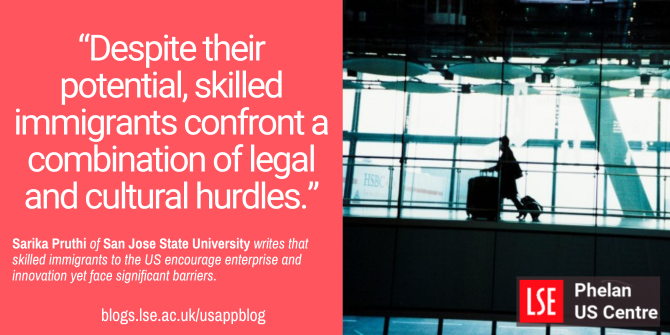 The 2024 presidential election campaign has seen Donald Trump and others speak very critically of immigrants to the United States. Sarika Pruthi writes that skilled migration to the US has contributed talent and to the creation of high-growth ventures, including in Silicon Valley. Yet despite their potential, she writes, skilled immigrants often confront a combination of legal and cultural obstacles including rules around qualifications needed for US occupations and increasing visa costs.
The 2024 presidential election campaign has seen Donald Trump and others speak very critically of immigrants to the United States. Sarika Pruthi writes that skilled migration to the US has contributed talent and to the creation of high-growth ventures, including in Silicon Valley. Yet despite their potential, she writes, skilled immigrants often confront a combination of legal and cultural obstacles including rules around qualifications needed for US occupations and increasing visa costs.
During the early part of the 2024 presidential primary race, former president Donald Trump claimed that the then Republican candidate Nikki Haley was ineligible to be the US president as her parents were not US citizens at the time of her birth. Nikki Haley is not alone in facing discrimination based on citizenship. The Trump administration consistently promoted an anti-immigration narrative deriding immigrants and their role in the US economy from its first day in office.
Skilled migration and the US
The US State Department recently announced a much-anticipated pilot program allowing skilled employees to renew H-1B temporary work visas in the United States. Expected to be published in April 2024, the final rule will reduce both cost and inconvenience, if passed. Yet, skilled immigrants in the US face challenges that hinder their success. The new proposal of the United States Citizenship and Immigration Services (USCIS) to increase the H-1B Electronic Registration Fee from $10 to $215 is just one example.
Historically, the US has hosted close to half of all skilled migrants of the OECD (Organization for Economic Co-operation and Development), a group of 38 member countries that shapes policies for equality, prosperity, opportunity and well-being for all, and one-third of skilled migrants worldwide. Skilled migration continues to grow as individuals increasingly gain international experience pursuing studies or managing overseas projects outside their home countries.
High rates of skilled migration in the US have contributed a talent pool for the creation of new high-growth ventures. According to the Wall Street Journal, about one-fourth of all technology and engineering companies started in the US between 2006 and 2012 had at least one immigrant founder. These companies employed 560,000 workers and generated $63 billion in sales. Per the National Foundation for American Policy (NFAP), founders originating from 25 different countries including Canada, Israel, UK, Germany, France, Ireland, Russia, Australia, and Ukraine have founded more than half (55 per cent) of America’s start-up companies valued at $1 billion or more, eBay, Google, Houzz, Yahoo, and Uber, being notable examples.
What is unique about skilled immigrants?
As well as possessing extensive professional experience, skilled immigrants are often highly educated. Per the Migration Policy Institute (MPI), Mexico and Venezuela rank among the top five countries of origin for all college-educated immigrants in the US According to Pew Research Center, education levels of Asian immigrants in the US are higher than the national average relative to the entire population within the country. Higher education is found to be a positive determinant of business ownership, with skilled immigrants exhibiting a higher rate of STEM entrepreneurship compared to their US-born counterparts.
Additionally, skilled immigrants are positioned to identify opportunities and unique market niches beyond their host and home countries based on the strength of their social capital. Originating in two or more countries, transnational entrepreneurs’ cross-cultural experiences stimulate creativity. Informal networks based on shared language, educational and professional experiences help to mobilize diverse resources such as capital, skills, information and advice to rapidly scale up technology ventures in global markets.

Photo by Gemma Evans on Unsplash
The challenges for skilled immigrants in the US
Despite their potential, skilled immigrants confront a combination of legal and cultural hurdles. Foremost is the struggle to find work that aligns with their professional qualifications and credentials from their home countries. First, The USCIS’ current rule regarding specialty occupations for foreign-born workers requires them to hold a US baccalaureate or higher degree in a “directly related specific specialty or its equivalent” for entering those occupations. According to the 2021 National Survey of College Graduates (NSCG), 18 percent of temporary visa holders working in computer occupations have a degree other than computer science or electrical engineering. Employers often hire workers who have gained the necessary skills through other coursework and experience.
Second, employers face a 6-8 month long process to obtain a Prevailing Wage Determination prior to requesting a labor certification to hire skilled immigrants, according to Forbes. A failure to designate a foreign national’s occupation often means a year-long delay and significant operational costs for both the government and the private sector. Third, according to NFAP, USCIS’ proposed exorbitant fee hike of over 2000 percent (from $10 to $215) for H-1B temporary skilled visa petitions is estimated to translate into an additional cost of approximately $100 million annually to employers, assuming similar registration levels as in previous years.
To be sure, the US Department of Labour is considering revisions to the permanent labor certification (PERM) process to include occupations in STEM and non-STEM fields to avoid lengthy processing for employers. The new pilot program to renew H1-B visas from within the US. is also well intended.
Finally, openness to incoming foreign talent has been one of the key factors underlying the outstanding success of the Silicon Valley innovation hub in California. Between 2006 and 2012, entrepreneurs of Indian origin founded one-third of engineering and technology companies started by immigrants in the valley, with founders from China, the UK, Canada, Germany, Israel, Russia, Korea, Australia, and the Netherlands following suit.
What can be done to remove the barriers for skilled immigrants?
First, we need to ease the rules to enable skilled immigrants to smoothly enter and operate in the US. The current restrictions appear incompatible with measures for attracting AI talent, as per President Biden’s recent AI Executive Order, as well as those aimed at sending temporary employees to customer locations due to the risk of litigation, which is why it is important to simplify them.
Second, we need to cultivate attitudes that reward diversity and innovation. While international student exchanges and study abroad programs in educational institutions can nurture a culture of early receptivity and openness, short-term overseas rotations and expatriate assignments in high-growth start-ups can instill respect for diverse values and perspectives. This is especially critical as firms play a central role in the selection, sponsorship, and employment of skilled immigrants entering the US.
Finally, we cannot disregard our own role in a democratic political system. Let’s elect leadership that champions rather than condemns the cause of skilled immigrants. Only then can we do justice to the talent and ingenuity of those who transcend national boundaries to create value for all who embrace them.
- Please read our comments policy before commenting.
- Note: This article gives the views of the author, and not the position of USAPP – American Politics and Policy, nor of the London School of Economics.
- Shortened URL for this post: https://wp.me/p3I2YF-dJ4



